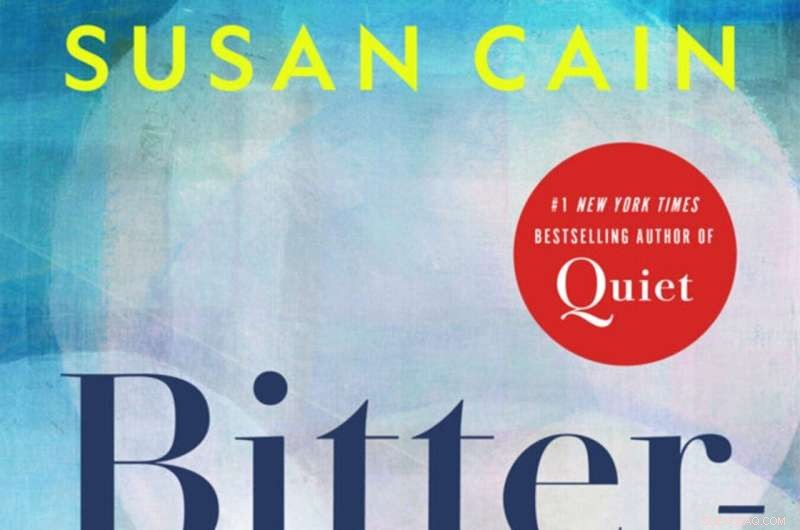
Wetenschap
Dat gevoel dat je krijgt als je naar droevige muziek luistert? Zijn menselijkheid

Susan Cain snuffelt het liefst rond in de minder onderzochte hoeken van can-do Amerika. In 2012 publiceerde ze "Quiet:The Power of Introverts in a World That Can't Stop Talking", wat een fenomeen werd en de aangeboren minder spraakzaam onder ons modieus en zelfs cool maakte. Het nieuwe boek van de afgestudeerde aan de Harvard Law School uit 1993, "Bittersweet:How Sorrow and Longing Can Make Us Whole", is een New York Times geworden bestseller. The Gazette sprak met Cain over hoe het omarmen van de ontroering van het leven kan leiden tot creativiteit en verbinding. Het interview is bewerkt voor duidelijkheid en lengte.
GAZETTE:Wat betekent het om een 'bitterzoete' gemoedstoestand te hebben?
CAIN:Het heeft te maken met het besef dat het leven een mix is van vreugde en verdriet, licht en donker, en dat alles en iedereen die je liefhebt vergankelijk is. Ik ervoer deze gemoedstoestand voor het eerst toen ik naar droevige muziek luisterde. Mijn hele leven had ik deze mysterieuze reactie op droevige muziek; het zou me een gevoel van verbondenheid geven met de mensen die het verdriet hadden gekend dat de muzikant probeerde te uiten. Eerst dacht ik dat ik het was, maar toen ik aan mijn onderzoek begon, realiseerde ik me dat veel musicologen dit hebben bestudeerd omdat veel mensen deze reactie al heel lang niet alleen op muziek hebben, maar ook op andere aspecten van de menselijke ervaring . Er is een diepe traditie over de hele wereld en door de eeuwen heen van mensen die deze hogere gemoedstoestand ervaren die voortkomt uit een besef van kwetsbaarheid en vergankelijkheid.
GAZETTE:Je legt een verband tussen deze gemoedstoestand en religie. Kun je daar wat over praten?
CAIN:We luisteren naar droevige muziek om dezelfde reden dat we naar de kerk of synagoge of de moskee gaan. We verlangen naar de Hof van Eden, we verlangen naar Mekka, we verlangen naar Zion omdat we in deze wereld komen met het gevoel dat er een meer volmaakte en mooiere wereld is waartoe we behoren, waar we niet langer zijn. Dat voelen we intens, maar we worden niet echt aangemoedigd om dat uit te spreken. Maar onze religies doen het voor ons. Kunst doet het ook. In "The Wizard of Oz" verlangt Dorothy naar een plek "ergens over de regenboog", en Harry Potter verlangt ernaar zijn ouders weer te zien. Dit is een fundamentele bouwsteen van elke menselijke ervaring. Dat is wat de muziek uitdrukt, en daarom luisteren we ernaar, en daarom voelen we ons zo met elkaar verbonden als we het doen, omdat dit onze meest primaire staat van zijn is. Maar omdat we allemaal de kost moeten verdienen, onze kinderen moeten opvoeden en ons leven moeten leiden, hebben we niet zozeer contact met die diepere staten. Kunst en muziek hebben een manier om ons terug te brengen.
GAZETTE:Veel mensen zouden vinden dat een positieve kijk op het leven prima is. Wat is daar mis mee?
CAIN:Er zijn twee dingen mis mee. Nummer één is dat het gewoon niet de waarheid vertelt van welke menselijke ervaring dan ook, omdat er geen mens is die niet zowel vreugde als verdriet ervaart, en licht en donker. Dat hoort gewoon bij het menselijk leven. Om elkaar te vertellen dat we niet de waarheid over onze ervaringen zouden moeten vertellen, is inherent ongeldig. But the deeper reason is that there is something about the melancholic side of our experience that is intimately connected to creativity and to transcendence. We shouldn't want to be robbing ourselves of this experience.
In the book, I developed a bittersweet quiz, with psychologists Dr. Scott Barry Kaufman and Dr. David Yaden, that people can take to measure how likely they are to experience bittersweet states of being. Dr. Kaufman and Dr. Yaden ran some preliminary studies and found that people who score high on the quiz, meaning that they tend to experience bittersweet states of mind, are also more inclined to states that predispose them to creativity, awe, wonder, spirituality, and transcendence. These are some of the most sublime aspects of being human, and they happen to be connected to our appreciation of how fragile life can be, and the impermanence of life.
GAZETTE:Why does sadness get a bad rap in American culture?
CAIN:The U.S. culture since the 19th century has been organized around the idea of winners and losers. This way of thinking originated in the economic sphere, where we started asking, "If somebody succeeded or failed in business, was that a question of good luck or bad luck?" Or "Was it something inside the person that made them have that outcome?" Increasingly, the answer that people arrived at was that it was driven by something within the person, and we started having this dichotomy of seeing each other as winners and losers. The more you have that kind of dichotomy, the more you want to behave in a way that indicates that you're a winner and not a loser. Anything that would be associated with loss, like sorrow, longing, sadness, or melancholia, would be seen as being part of the loser side of the ledger.
Being a winner was associated with being successful and cheerful. Even back in the 19th century, the psychologist William James commented on how it was becoming unfashionable for people to complain about the weather because it was seen as being too negative. During the Great Depression, a common view was to see those who lost everything as losers. In my research, I found a news article with the headline:"Loser Committed Suicide in the Streets." That is astonishing if you think about it, but the use of the word loser has only increased over time.
I would also say that religion has played a role. The U.S. was originally a Calvinist country, and in the Calvinist religion, you were predestined for heaven or hell. There was nothing you could do about it, but you could show that you were one of the people who was going to heaven. The way to do it was by working hard, and then that thinking got transferred later in the 19th century into:"Are you a winner or a loser?"
GAZETTE:Why should people embrace the bittersweet aspects of life? What's in for them?
CAIN:The first thing I would say is to look at the data, which is quite overwhelming. Psychologist Laura Carstensen at Stanford University did some fascinating studies where she showed that people who are attuned to what she calls life's fragility—the fact that our days are numbered—also tend to find a sense of meaning in their lives and have a greater sense of gratitude; they are more focused on their deeper relationships, and they're less likely to feel angry and irritable.
There's also the work by David Yaden, who found that people who are in transitional states of life, including divorce and approaching the end of their lives, also tend to reach those states of mind that Laura Carstensen was talking about. We saw it collectively in the United States after 9/11, when many people turned in the direction of meaning. We saw a huge increase in applications for Teach For America and to take jobs as firefighters, nurses, or teachers. We're seeing that now in the wake of the pandemic, with more applications to medical and nursing schools and people wanting more meaning from their work and personal lives.
GAZETTE:You wrote about the power of introverts in "Quiet." This book is about the strength of embracing a bittersweet outlook on life. Why are you drawn to these underrated aspects of humanity?
CAIN:I think that both these aspects of humanity are connected. I also think there's something about writing books that gives us the permission to discuss things that aren't as easy to talk about in everyday life. To me, the whole point of writing books is to look at the unexamined, the unspeakable, and the unarticulated. I'm just most interested in talking about that which can't be said when we're just chatting at the grocery store.
GAZETTE:What do you hope people will take away from this book?
CAIN:I would like people to be less afraid of experiencing melancholy, sorrow, and longing, and to embrace the powers that bittersweetness has to offer:the powers of creativity, connection, and transcendence. It has been very interesting for me to see the response from readers of "Bittersweet," which is a very different book from "Quiet." But the letters I'm getting from readers of "Bittersweet" are very similar to the ones that I got from those who read "Quiet" in that what people say over and over is, "I feel understood," "I had never been able to give voice to it," "I feel validated." A lot of people write me saying that after reading the book they're realizing that they have suppressed the melancholic side of their nature all their lives, and they're also realizing how valuable that side of their nature is. There has been this curious echo with "Quiet," which I didn't set out to do, but it ended up happening.
 Wat is de pH van gedestilleerd water?
Wat is de pH van gedestilleerd water?  Naald in een hooiberg ontdekking in zoektocht naar schone energietechnologie
Naald in een hooiberg ontdekking in zoektocht naar schone energietechnologie Onderzoekers rapporteren efficiënte platformtechnologie voor de productie van cefalosporine-antibiotica
Onderzoekers rapporteren efficiënte platformtechnologie voor de productie van cefalosporine-antibiotica Amylase activiteit in de maag
Amylase activiteit in de maag Water helder maken na het toevoegen van kleurstoffen voor levensmiddelen
Water helder maken na het toevoegen van kleurstoffen voor levensmiddelen
Hoofdlijnen
- Zachte apparaten, aangedreven door gestresste algen, gloeien in het donker wanneer ze worden geplet of uitgerekt
- Ter verdediging van kamsalamanders - waarom deze ongrijpbare amfibieën de moeite waard zijn?
- Onderzoek toont belang aan van dieren in het wild bij het bestrijden van teken
- Aardappelziekte chemisch aanvalsmechanisme uitgelegd
- Welke cellen zou je gebruiken om DNA van een levende persoon te extraheren?
- Hoe robots de productiecrisis van antibiotica kunnen oplossen
- Wildlife betaalt de prijs van illegale begrazing in Kenia
- Hoe zijn bacteriën en plantencellen gelijk?
- Hoe natuurlijke selectie werkt
- Moeten schrijvers alleen schrijven wat ze weten? Wat ik heb geleerd van mijn onderzoek

- Amerikaanse grondleggers waren geobsedeerd door megafauna uit de Amerikaanse ijstijd

- Hoe kan de geneeskunde de loonkloof tussen mannen en vrouwen dichten?

- Diversiteitsrapport van Facebook:inspanningen die zwarte en Latijns-Amerikaanse werknemers nog steeds mislukken, vooral vrouwen

- De eerste mensen in Tasmanië moeten spectaculaire aurora's hebben gezien

 Genderverschillen in beroepsinteresses nemen af met de leeftijd, studie vondsten
Genderverschillen in beroepsinteresses nemen af met de leeftijd, studie vondsten When Is Hurricane Season in Hawaii?
When Is Hurricane Season in Hawaii?  Nieuwe technologie kan zuurstof krijgen, brandstof uit het zoute water van Mars
Nieuwe technologie kan zuurstof krijgen, brandstof uit het zoute water van Mars Berekening verdunningen
Berekening verdunningen Het is officieel:VK brak temperatuurrecord tijdens hittegolf
Het is officieel:VK brak temperatuurrecord tijdens hittegolf Nieuwe hydrogel ontwikkeld om tape van eeuwenoude tekening te verwijderen
Nieuwe hydrogel ontwikkeld om tape van eeuwenoude tekening te verwijderen Hoe te delen met behulp van logaritmen
Hoe te delen met behulp van logaritmen  IJzer in de Groenlandse ijskern ten opzichte van Aziatische lössrecords in de afgelopen 110, 000 jaar
IJzer in de Groenlandse ijskern ten opzichte van Aziatische lössrecords in de afgelopen 110, 000 jaar
- Elektronica
- Biologie
- Zonsverduistering
- Wiskunde
- French | Italian | Spanish | Portuguese | Swedish | German | Dutch | Danish | Norway |

-
Wetenschap © https://nl.scienceaq.com

